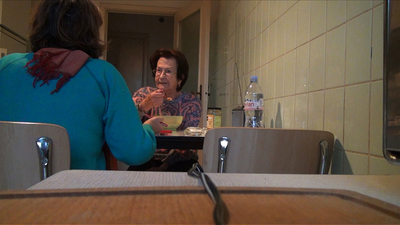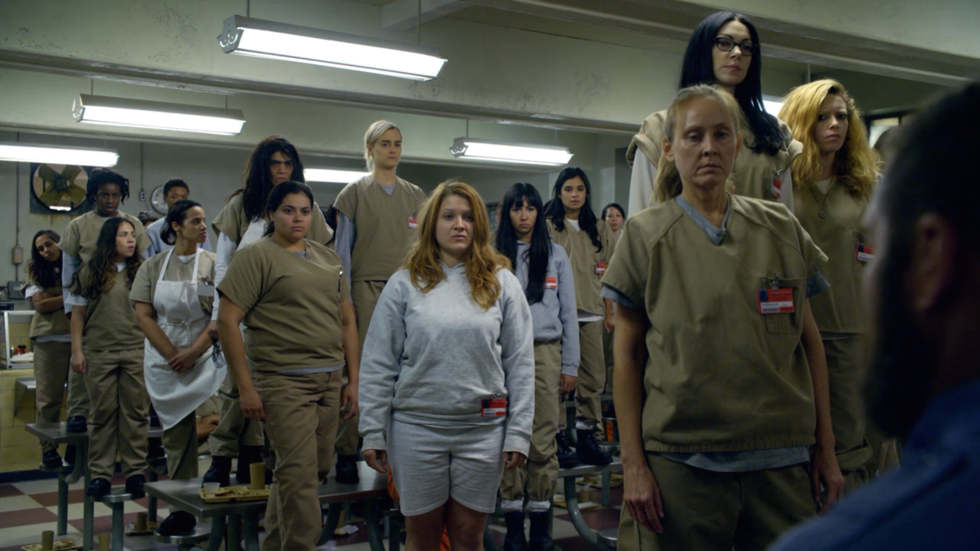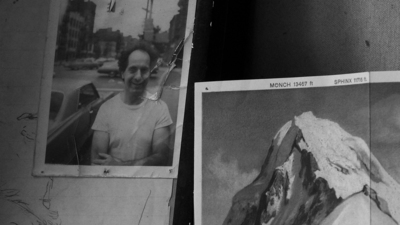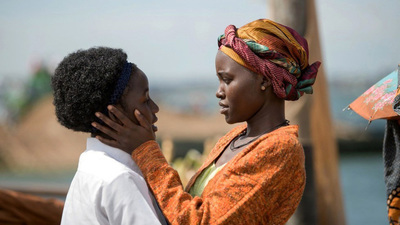
BY MATTHEW ENG |
Damaged Places: On ORANGE IS THE NEW BLACK’s Profound Study of the Powerless
How the Netflix drama toughened its mindset and delivered its most important season to-date.

Warning: major spoilers to follow
Spike Lee frequently discusses, with by now bemused frustration, how white audience members still approach him to this very day to ask if Mookie, the pizza boy protagonist he played in Do the Right Thing, actually did the right thing during the film’s fiery finale.
The title of Lee’s signal cinematic masterpiece is frequently raised as a cut-and-dry ultimatum to viewers, who are often posed the same exact question that has stalked Lee since the film first debuted in 1989: did Mookie do the right thing? I’ve been in at least four separate film classes in which professors talk circles around the question and students, in turn, bristle at the audacious ambiguity of both Mookie’s actions and Lee’s writing. But the question itself or, rather, its continued point of focus has always been perplexing: how has one of the most disturbing sequences in film history, in which a black man is suffocated from beneath a police officer’s strangling baton, managed to trigger single-minded scrutiny on the actions of one man and not the larger, detrimental institution at fault?

For reasons that should be fairly obvious, Do the Right Thing has been pressing itself pretty heavily on my thoughts lately, even more so after finishing the exceptional and almost certainly peak fourth season of Netflix’s women’s prison saga Orange is the New Black. The murder of Radio Raheem at the climax of Lee’s film continues to cast a long shadow over every single artistic depiction of black life taken, especially over the last few years as the millennial-mobilized Black Lives Matter movement has trickled down into several mainstream forms, particularly television.
This past fall, Taraji P. Henson’s Cookie Lyons slipped into a gorilla suit and emerged in a cage during the season premiere of Empire, both fiercely reclaiming Marlene Dietrich’s iconic Blonde Venus dress-up and bluntly politicizing it with lines like, “How much longer are they gonna treat us like animals?” black-ish, The Carmichael Show, The Good Wife, Law and Order: SVU, Scandal, and several others shows have also crafted episodes around the movement, with moving, trenchant, and occasionally disastrous results. Even some period-specific programs that contend with race from a historical vantage — like WGN’s new Underground or Steven Soderbergh’s The Knick — are given added weight when watched within such a fraught context.
Orange is the New Black doesn’t just tackle the topic but embodies it within a season-long format, revealing a larger, broader evil than the day-to-day treacheries of inmate rivalry that we have become accustomed to. For two of its three prior seasons, Orange made its villainy decidedly human-sized. In season one, Taryn Manning’s fanatical bully Pennsatucky tortured Taylor Schilling’s Litchfield newbie Piper before growing a conscience and becoming one of the series’s most scrappily heartbreaking characters. Lorraine Toussaint’s Vee, a cut-glass drug maven, dominated the second season, diabolically recruiting henchwomen and throwing her own prison family under the bus, only to find herself there, quite literally, by season’s end.

Following a faith-based third season, showrunner Jenji Kohan and her fellow writers have awakened the show to even tougher political realities, finally approaching the inevitable issue of institutional racism by giving its divided inmates a truly poisonous force to unite against: a new regime of corrupt corrections officers, most of them veterans hired to cut costs by the prison’s new privatized corporate overlord, M.C.C., and left under the rule of a hulking, malicious new captain, Piscatella (Brad William Henke).
What emerges from this newfound concentration is a prismatic and multi-tiered portrait of what it means to be powerless within the prison-industrial complex. This isn’t necessarily a new thread for the series, whose characters have all been made to bend to higher authority over the three preceding seasons, but rarely has the sense of impotency been this effectively unsettling. More than any of its previous seasons and more than any other show on television right now, Orange’s fourth season amplifies the pure exasperation of finding one’s basic human rights snatched away as well as the frustration of the bystander who is equally helpless at intervening or restoring them.
In one of the season’s strongest plot lines, a stop-and-frisk procedure is initiated against the inmates of color to curb alleged gang activity, a measure spurred by Piper, who inadvertently initiates a White Lives Matter group as part of a desperate grab to keep her illegal panty ring afloat amid unwelcome competition from Maria Ruiz (Jessica Pimentel). Although briefly glimpsed in early seasons, Pimentel’s Maria has become an increasingly prominent symbol of the type of hardened survivalism that can only emanate from a crippling loss of control. In the season three premiere, she watched as her boyfriend put an end to their young daughter’s visits, unable to stop or even plead with him from the inmate’s side of a security checkpoint. In season four, she finds her sentence extended for three more years after being set up by Piper in one of the most crushing scenes of the season, erupting with fury in the face of Piscatella’s indifference and swiftly realizing, once and for all, that the deck was always stacked against her.

Maria’s plight evokes an enraged response from her fellow Latina inmates, but it also spurs a sense of ruthless retaliation among them. There’s a real sense of urgency to the impetuous and steadfast activism of Blanca (Laura Gomez), who refuses to shower as a bitter means of avoiding the stop-and-frisk and is forced to stand on a cafeteria table until she complies. She doesn’t and endures for a matter of days, soiling herself and turning even this humiliating act into a performance of righteous defiance for all to witness.
These arcs characterize powerlessness as a crushing force of oppression and degradation, a cyclical ill that comes with the territory. For the bulk of the season, Laverne Cox’s Sophia continues to waste away in solitary confinement, a victim of both transphobic hostility and a system unable to ensure her safety. Inmates like Diane Guerrero’s Maritza, Uzo Aduba’s Suzanne, and Kelly Karbacz’s Kasey, a white supremacist with more bark than bite, are mistreated, often physically, by several sadistic guards for no other reason than personal amusement in some of the most unnerving scenes of the series’s entire run.
But powerlessness is also a larger state of being, one that receives an increasingly nuanced treatment as relationships shift and characters reshape. Dascha Polanco’s once-idealistic Daya, separated from her child and abandoned by the C.O. who romanced her, finds herself holding a different guard’s life in her hands during the inmate uprising that ends the season. Natasha Lyonne’s Nicky returns from maximum security, only to falter to her addiction in an environment where hard drugs have become easier than ever to attain. Pennsatucky is forced to inhabit the same space as James McMenamin’s Coates, the ingratiating guard who befriended then raped her in the third season. In this season’s gutsiest move, Coates becomes a figure of skeptical empathy, his eyes opening to the abuses of power that he is part and parcel of. Meanwhile, several characters continue to grapple with varying forms of mental illness, including Michael Harney’s hangdog counselor Mr. Healy, who unsettlingly retreats into his latent depression in one of the season’s most unexpectedly moving arcs.

From Healy to Coates to Nick Sandow’s perpetually beleaguered Warden Caputo, Orange takes real risks in positioning these male authority figures as even remotely sympathetic presences, similarly — if not equally — susceptible to the same system that harms those they oversee. Caputo, in particular, has emerged as a fascinating depiction of flawed leadership, a man who longs to enact real change but only manages to capitulate to bureaucratic pressures and his own faulty moral compass. Although the series never pushes the “Litchfield-as-America” parallels too forcefully, it is impossible not to view Orange as a microcosmic representation of the nation, where the governing administration is only ever ineffectual and more and more civil liberties are blatantly denied.
This is most evident in the season’s twelfth episode, “The Animals,” which, like Do the Right Thing, builds to a tragedy — the accidental murder of joyful fan favorite Poussey (Samira Wiley) by the hopelessly incompetent Officer Bayley (Alan Aisenberg) — after a toxic accumulation of racial tension and inhumane treatment results in rapid and ultimately radicalized unrest among the prison population. By the season finale, in which Caputo defends the guard’s actions on a televised press conference during which he fails to even mention Poussey by name, Orange has managed to summon up the memories of countless black lives lost to systemic racism: those like Sandra Bland, Mike Brown, and Alton Sterling, whose names are indelible, as well as the ones who have slipped between the cracks and remain absent from headlines and hashtags.
Since its premiere, Orange has garnered consistent criticism from those who have accused the show of fostering a somewhat morbid fascination with black suffering. Such critiques have recurred in the wake of Sophia’s persecution and the death of the black-queer Poussey, plot developments that spring (not unimportantly) from the minds of a predominantly white writing staff. Their points are valid, but I think it’s unfair to say that Kohan and company illustrate such suffering for purely gratuitous means or that there aren’t any deeper and deserving insights within these characters’s stories, particularly Poussey’s.

Like any fictional work contending with real-world issues, the mirror Orange holds up to our society can be a cracked and even distorted one, but we can still find our reflection all the same. The show has its finger pointed at a more specific power structure than Do the Right Thing, but it contains the same frustrated, galvanizing spirit that demands that these prejudicial establishments be put on trial and allows their characters to exist as part of a larger fabric while never denying them their right to be more than a statistic. The story of Poussey is ultimately one of a bookish, bilingual army brat whose respectable background didn’t preclude her from becoming yet another fatality of a system that exercises and deprives power at its own free will, handing out convictions against people of color at an overwhelming rate. But Poussey’s story is also one of love, friendship, and levity, punctuated but not effaced by her unjust death.
In the breathtaking flashbacks of the season finale, we follow Poussey as she embarks on a doubtful but ultimately rapturous journey around New York City in search of a stolen phone, all leading up to the night of her arrest for drug possession and illegal trespassing. At one point, she gets a lift from a group of biking monks, who turn out to be costumed members of Improv Everywhere. On the same Brooklyn bank where she will shortly be arrested, Poussey smokes a joint with one of the performers, who shares a belief that could very well be the show’s guiding motto: “I believe this world is a damaged place and if you can find a sliver of happiness, stay in it, as long as you can.”
Some critics may still take issue with Orange is the New Black’s lightness of tone, its ability to maintain high spirits as the world around it darkens. But there is a freedom of expression to such moments, which are more than just respites from the pressures and confusions of correctional life. The show’s sense of humor takes many forms — sly one-liners, goofy pop-cultural references, confrontational candor — that each work wonders in disarming viewers, even as they remain the characters’s strongest, most personalized weapons against a system that seeks to break them completely. In such dehumanizing circumstances, the ability to joke, to laugh, and to smile is a fortifying declaration in and of itself.

In the final seconds of the season, Poussey stares in awe at the Manhattan skyline, only to turn directly to the camera in an instantly iconic moment of the series, breaking the fourth wall to flash us one final luminous grin. It’s a look of freedom, however fleeting, but also one of individual, perseverant power that, in spite of everything, can never be erased. Or forgotten.
Matthew Eng (@Eng_Matthew) is an associate editor and contributing writer for Tribeca Film.

